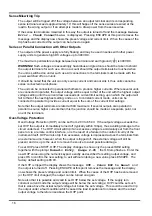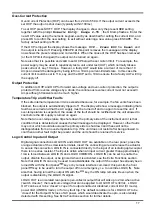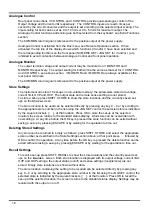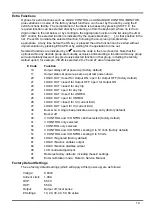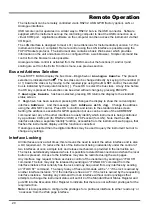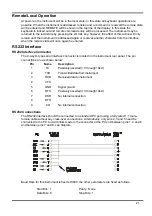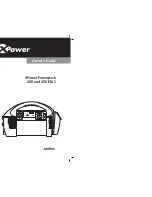
EMC
This instrument has been designed to meet the requirements of the EMC Directive 2004/108/EC.
Compliance was demonstrated by meeting the test limits of the following standards:
Emissions
EN61326-1 (2006) EMC product standard for Electrical Equipment for Measurement, Control and
Laboratory Use. Test limits used were:
a)
Radiated: Class A
b)
Conducted: Class A
c)
Harmonics: EN61000-3-2 (2006) Class A; the instrument is Class A by product category.
Immunity
EN61326-1 (2006) EMC product standard for Electrical Equipment for Measurement, Control and
Laboratory Use.
Test methods, limits and performance achieved are shown below (requirement shown in
brackets):
a)
EN61000-4-2 (1995) Electrostatic Discharge : 4kV air, 4kV contact, Performance A (B).
b)
EN61000-4-3 (2006) Electromagnetic Field:
3V/m, 80% AM at 1kHz, 80MHz – 1GHz: Performance B
g
(A) and
1.4GHz to 2GHz: Performance A (A); 1V/m, 2.0GHz to 2.7GHz: Performance A (A).
g
minor regulation deviation at ~140MHz and ~250MHz at 3V/m.
c)
EN61000-4-11 (2004) Voltage Interrupt: ½ cycle and 1 cycle, 0%: Performance B (B);
25 cycles, 70%: Performance A (C); 250 cycles, 0%: Performance B (C), if Function 11
set (Output status at power-up same as at last power-down), otherwise Performance C.
d)
EN61000-4-4 (2004) Fast Transient, 1kV peak (AC line), 0·5kV peak (DC Output),
Performance B (B).
e)
EN61000-4-5 (2006) Surge, 0·5kV (line to line), 1kV (line to ground), Performance B (B).
f)
EN61000-4-6 (2007) Conducted RF, 3V, 80% AM at 1kHz (AC line only; DC Output
connections <3m, therefore not tested), Performance A (A).
According to EN61326-1 the definitions of performance criteria are:
Performance criterion A:
‘During test normal performance within the specification limits.’
Performance criterion B:
‘During test, temporary degradation, or loss of function or
performance which is self-recovering’.
Performance criterion C:
‘During test, temporary degradation, or loss of function or
performance which requires operator intervention or system reset occurs.’
Where Performance B is stated it is because DC Output regulation, or V & I measurement
accuracy, may deviate beyond Specification limits under the test conditions. However, the
possible deviations are still small and unlikely to be a problem in practice.
Note that if operation in a high RF field is unavoidable it is good practice to connect the PSU to
the target system using screened leads which have been passed (together) through an absorbing
ferrite sleeve fitted close to the PSU terminals.
Cautions
To ensure continued compliance with the EMC directive observe the following precautions:
a)
after opening the case for any reason ensure that all signal and ground connections are
remade correctly and that case screws are correctly refitted and tightened.
b)
In the event of part replacement becoming necessary, only use components of an identical
type, see the Service Manual.
6

















